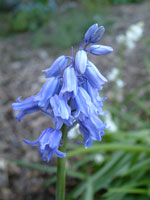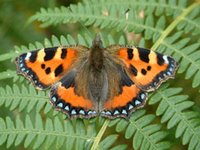June is a busy month for many wild animals, especially birds, hedgehogs, foxes and bats with young to care for. It can sometimes be tempting to peep at the young in nests but this isn't a good idea. It stresses chicks and they are unable to fly away from the perceived threat. Adults may be very protective of their young at this vulnerable time. Alternatively, they could abandon the nest if they are frightened.
Well-meaning gardeners often worry about birds that have fallen from their nest and take them into their care. This can stress the young birds, however, and it takes specialist knowledge to care for them properly. Most adult birds have strong instincts to look after their young and they will continue to feed them on the ground. The most helpful contribution you can make is to keep cats away. Occasionally, other birds, even those of a different species, will adopt an orphan!
 Spring-flowering bulbs such as bluebells, daffodils and grape hyacinth have died back now and the nutrients in the leaves have returned to the bulb. This is a good time, then, for dividing the clumps to multiply stock. It will also renew vigour, ensuring plenty of nectar in spring for butterflies, honey bees and mason bees. Snakeshead fritillaries need to be divided and replanted every 4 years.
Spring-flowering bulbs such as bluebells, daffodils and grape hyacinth have died back now and the nutrients in the leaves have returned to the bulb. This is a good time, then, for dividing the clumps to multiply stock. It will also renew vigour, ensuring plenty of nectar in spring for butterflies, honey bees and mason bees. Snakeshead fritillaries need to be divided and replanted every 4 years. 



